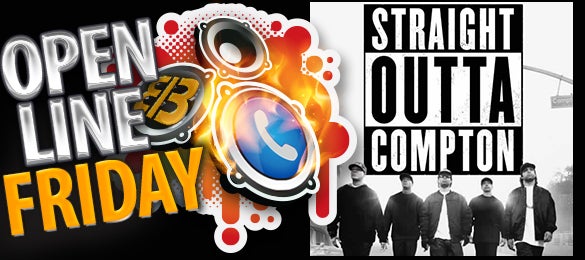CALLER: Thank you for taking my call, Rush, I really appreciate it. Honored to speak with you. I got one main point, Rush, as a culture — and I’m black. I didn’t grow up with “African-American,” if you will. I’m just a black guy. As a culture, a people, I think we need to examine one of the main credos of gangsta rap music and its influence on the black community. Like I said, I saw Straight Outta Compton the other night. One of the scenes really touched me — and I’ll be really quick.
 The rappers had signed a deal with a manager, they’re sitting on the stoop out on the street and eating lunch just innocently, two cops came up, overtly racist, overtly abusive. It was obvious. They made ’em get face down on the ground. Long story short, they got up after their manager’s help, went back inside, Ice Cube, who everybody knows is a main, famous rapper, stared the guy down, stared the cops down. The cops are just cursing him and degrading him. Went inside, and he penned one of their famous song songs, NWA, F’ the police.
The rappers had signed a deal with a manager, they’re sitting on the stoop out on the street and eating lunch just innocently, two cops came up, overtly racist, overtly abusive. It was obvious. They made ’em get face down on the ground. Long story short, they got up after their manager’s help, went back inside, Ice Cube, who everybody knows is a main, famous rapper, stared the guy down, stared the cops down. The cops are just cursing him and degrading him. Went inside, and he penned one of their famous song songs, NWA, F’ the police.
RUSH: Hm-hm.
CALLER: And in the scene it was, you know, at that point of the movie I didn’t watch even the rest of it, at that point of the movie I was like, okay, he handled it as a man, he took the high road. He had an outlet, a creative artistic outflow, that’s great, but one of the things in this music or in this culture that is killing black people and inner city people is the fact or this credo of street cred. Now, any rapper will tell you, any rapper worth their salt will tell you, I live what I do, I’m real with this, that’s the work.
RUSH: Right.
CALLER: I’m not just fronting.
RUSH: When they have been questioned about this, I remember all this, the group NWA, I remember back in the early days of this show when examining cop killing lyrics and so forth, we had debates on this program about to what degree, if any, do lyrics like that in pop music influence cultural behavior and there were some people: “Come on, you can’t say that because there’s too much of it. It would be constant anarchy if that stuff was that influential.” And it is not just that stuff. I mean, you have all kinds of reprobate behavior in every movie you look at these days and yet —
CALLER: Well, the difference, Rush, excuse me, the difference that I see — and I’ve heard that argument, but I never saw Denzel going out and saying after a violent movie, “That’s how I roll.” I never saw Laurence Fishburne or Don Cheadle get up and say, “Yeah, that’s right, I keep it real.” We have this thing and it perpetuates the poison that’s in the minds of our young people, and they’re just like the poisoned minds of, you know, foregone generations who thought, you know, they walked up to somebody and say, “Hey, boy, hey, you black Negro.”
RUSH: Yeah.
CALLER: And now it’s the opposite, black kids can get away with walking up to people — and I witnessed it as a kid, I’m black and white — I witnessed people walking up on the basketball court to white people saying, “What up, white boy.” Or you hear in the movies today, people talking about, “What kind of white stuff is this?” It’s a double standard. It’s the same evil, bitter racist hate that’s infecting our youth today, and if we don’t confront it culturally from within and from without, it’s no better than racism coming from white lips or white people. It’s the same poison, Rush.
RUSH: You’re profoundly correct about this. But let me ask you about it from the standpoint or the context of what I believe is a genuinely divided country. I think there are two countries now. On the side that you were just talking about, if you have a genuine sit down with them, you learn that with them it’s a chicken-or-egg thing.
 They will not deny that they have that attitude about the cops, but they will tell you that they didn’t start it. That the cops’ behavior towards them is what started everything, particularly the cops’ behavior toward innocent neighborhood blacks and that that music is simply the result of the culture and the music is the art that expresses how they have been forced to live and what their life experiences are.
They will not deny that they have that attitude about the cops, but they will tell you that they didn’t start it. That the cops’ behavior towards them is what started everything, particularly the cops’ behavior toward innocent neighborhood blacks and that that music is simply the result of the culture and the music is the art that expresses how they have been forced to live and what their life experiences are.
And so when you talk about solutions, you eventually get, okay, well, where does the ultimate blame lie, because whoever is really responsible has to acknowledge it and either apologize, pledge not to do it anymore, and with neither side admitting that they had anything to do with starting it, how does it get solved?
CALLER: Well, I think it gets solved the same way that slavery got solved, the same way racism from white people got solved. We confronted it. We said, “This isn’t right how you’re treating people. This isn’t right how you’re raising your kids and teaching them and perpetuating this stuff.” We have to look at ourselves and say, look, there’s a real choice. Yeah, slavery was disgusting. Yeah, some police are bad apples and they do abuse kids, that’s disgusting, we need to stop it and stomp it out. But there’s a real choice that’s at hand, Rush. Everybody has to make it. One can just succumb to all this hate and lead one’s life — you know, the Palestinians do the same thing.
RUSH: Yeah.
CALLER: The Israelis do the same thing. When they’re, you know, imbued with hatred and taught to hate Arabs for no reason, Arabs taught to hate Jews for no reason, we have to stop and make a choice. We can succumb to all this hate and lead one’s lives like a script of bitterness with low aspirations or with too many excuses. Or we can overcome, we can fight, we can claw, we can dig, we can prevent all this perpetuating hate.
RUSH: That’s the most intelligent answer to this I have ever heard in all the years that I’ve been talking about this.
CALLER: Thank you.
RUSH: And as I listened to you say it and I imagine it being implemented, the people that actually try to do that, I’m thinking, you know, you naturally think okay, what will some of the obstacles be? And one of them is that, for whatever else is going on, there are a lot of people who have gotten really rich, I mean, really wealthy as a result of this art form, hip-hop, rap, whatever you call it. And you’re gonna be asking some of them to basically throw away their vehicle to financial independence and wealth by asking them to get rid of that kind of lyric line in their art or in their music.
CALLER: I don’t know that it’s necessary to get rid of it. It is expressive just like a Mafia movie or an action movie, but I would challenge them and those listening, anyone who perpetuates that stuff. I would challenge them this way, Rush: “If you really care about black people, about inner city people, about the ghetto, about the ‘hood — if you really want solutions — then at least admit that though you might have ‘slung rock’ in the past, been a dope dealer, been a bad boy in the past, that’s fine.
RUSH: Well.
CALLER: “But listen, kids, we can’t continue this. This is just entertainment.” Because the kids aren’t hearing it. They emulate these guys because these guys portray the reality of it.
RUSH: Amen.
CALLER: And, you know what? All the other charlatans who’ve gotten rich, too, if they really care, let’s get down to Chicago. Let’s hold arm in arms with the soldiers that are marching in the streets and helping — trying to help — the community bridge the gap with gangs and all that stuff. If these rich artists and rappers really care, which I believe some of them really do, then let’s get back to the community in a real way instead of this.
RUSH: That inspires another question. How many…? I guess we don’t know, but how many of them really want a solution to it? I can… You know, my understanding (some would say “fear”) is that there are a lot of people — not rappers, but I’m talking about race-business executives — making a lot of money on the basis that this strife and conflict is never ending.
CALLER: Because they keep the cycle of victim going, Rush.
RUSH: Right.
CALLER: And that’s —
RUSH: So if some of these people don’t want a solution… I’m sorry to keep throwing up obstacles to you, but the reason I am is because you’re really… You’ve got brilliant answers here. I’m imagining I’m not going to be able to stump you on anything.
CALLER: I think most black people, white people, all people, Americans, we need to stand up and say, “Listen, Jesse Jackson, listen Al Sharpton, listen race-baiters, whoever you may be — of whatever political stripe you may be, I don’t care — if you’re gaming the system and if you’re perpetuating hate in our kids’ hearts, I don’t care if you’re a rapper, you’re a politician, you’re an Action Coalition, you’re a street organizer. Whatever you call yourself, if you’re perpetuating this in our children’s hearts, stop.
 “Because if you don’t stop, it’s just showing them that they can be bitter, they can be bigots, they can call people ‘white boy.’ They can be racist, and because they’re black…” And enough of this stuff, too, Rush, with the, you know, “Black people can’t be racist.” That’s baloney. And they say they can’t be racist because they have no power? So how can Little Johnny White Boy be a racist if he has no power? It’s a sham, Rush.
“Because if you don’t stop, it’s just showing them that they can be bitter, they can be bigots, they can call people ‘white boy.’ They can be racist, and because they’re black…” And enough of this stuff, too, Rush, with the, you know, “Black people can’t be racist.” That’s baloney. And they say they can’t be racist because they have no power? So how can Little Johnny White Boy be a racist if he has no power? It’s a sham, Rush.
RUSH: Yeah. It is.
CALLER: And I’m tired of it. I’m sick of it. It pains my heart for black people, for America —
RUSH: It does mine, too.
CALLER: — for kids who are really struggling.
RUSH: It pains —
CALLER: Exactly.
RUSH: Nobody wants an America like that. Well, I say “nobody.” Most people, it pains their hearts. It certainly does mine. Every one of those cop shots, every… The whole Ferguson thing, the fact that it happened, the way it went down? Nobody wants this.
CALLER: That’s right.
RUSH: It seems so senseless. Can you hang on through the break? I’ve gotta take a break. There’s one other question I have for you.
CALLER: Yes, sir.
RUSH: Okay, good. You see why when we only had a couple minutes yesterday, my instincts said it was not enough time? So he let us call back again today.
BREAK TRANSCRIPT
RUSH: Back to Curtis in Boca Raton. I wanted to ask you a personal question. What do you do? And you don’t have to answer it if you don’t want to.
CALLER: I’m a manager at a Financial Services Company.
RUSH: And have you…? You’ve thought about this, obviously extensively. Have you —
CALLER: Yes, sir.
RUSH: Have you any aspirations to do anything to actually help implement some of this? Do you have political aspirations?
CALLER: Yeah, absolutely. Between the day job and, you know, just making a living, I just got married about eight weeks ago. Absolutely, Rush.
RUSH: Congratulations, by the way. (clapping)
CALLER: Thank you, sir.
RUSH: Happy to hear that for you. Well, we wish you the best here, and I really… It’s fortuitous that you got through here yesterday; it’s fortuitous that you let us have your phone number to call you back when we didn’t have time. ‘Cause, Curtis, I’m telling you honestly: You had some of the most insightful and intelligent answers to this that I have ever heard, primarily and spectacularly your answer when I asked, “How do you deal with the fact that for some of these people, that’s their reality?”
It’s a chicken-and-egg thing. Look, who started it? There is a definite thing to blame and if they won’t blame it, your answer was we just have to face it head-on like we faced slavery. Anyway, it was interesting because it highlights all the obstacles that are in the way. And one of the obstacles is personal wealth. There are a lot of people… This not a criticism; it’s an observation. It’s kind of important here. There are a lot of people who have gotten incredibly wealthy with these lyrics and that art form.
And there are other people getting incredibly wealthy claiming to have some sort of solution to this strife, but in truth don’t want any solutions because the strife and the conflict is how they have become known. So it’s a… But it is ripping the country apart. It’s also… By the way, Curtis, it also has political sponsorship. That’s another thing. We didn’t even get into that aspect of it. But when you ask who benefits from all this, there are certain people in a certain political party who’ve made sure they benefit from it. But I hope that people with ideas like yours ultimately prevail.



